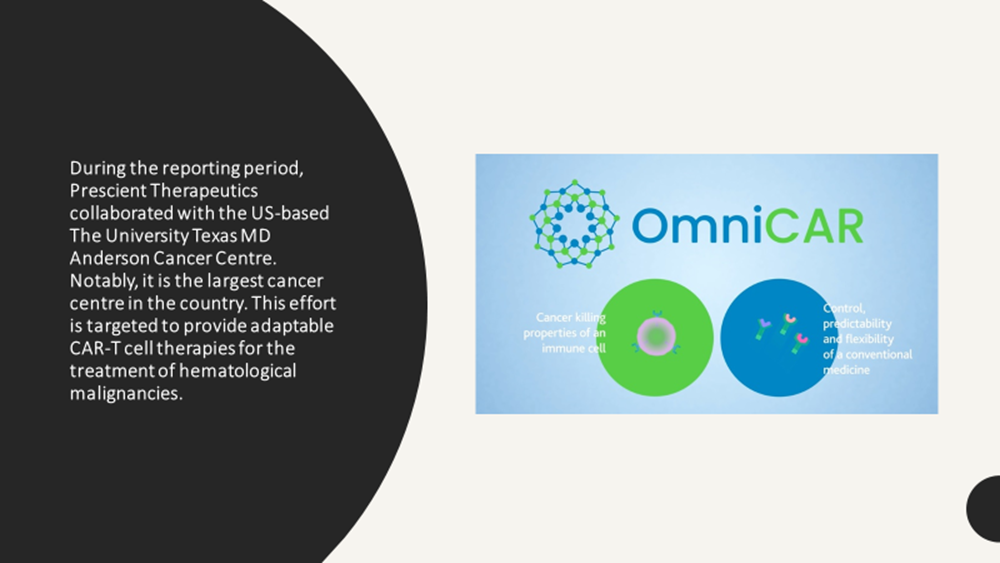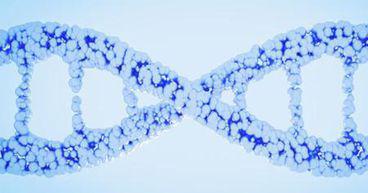Highlights
- Prescient Therapeutics’ latest half-year report focuses on progress made on its targeted and cell therapies.
- The ASX-listed company, which is committed to developing novel cancer therapies, has also reported about new collaborations.
- The company’s new cell therapy enhancement platform CellPryme-A was unveiled at the CAR-TCR Summit.
Clinical-stage oncology entity Prescient Therapeutics (ASX:PTX) -- focused on the development of novel and personalised cancer-related therapies -- has released its half-year report for the period ended 31 December 2022.
The company has highlighted an increase in net assets for the period, besides the “strong financial position” of PTX following a capital raise of AU$11.3 million through a Share Purchase Plan (SPP) and a top-up placement. In November last year, the company also received a tax refund of AU$1.6 million by the Australian government for its research & development activities.
Below are the other major operational highlights of Prescient Therapeutics during the reported report.
Targeted Therapies
PTX-100
Prescient reports that its PTX-100 received the Orphan Drug Designation from the US Food and Drug Administration (FDA) during the half year ended December 2022. This pertained to PTX-100’s use in treatment for peripheral T cell lymphomas (PTCL). The FDA designation is a special status for drugs that are designed to treat rare diseases, Prescient says.
PTX-100 also continued to demonstrate encouraging efficacy and safety profile during the half year with respect to patients with relapsed and refractory TCL. The drug trial has advanced to an expansion cohort of 12 patients, with Professor H. Miles Prince, AM leading this endeavour.
PTX-200
PTX 200 -- Prescient’s novel PH domain inhibitor -- is undergoing trial at the Moffitt Cancer Centre. PTX says that the study so far on four patients exhibited complete responses and on one patient reflected a partial response. The drug is being studied to treat relapse and refractory acute leukaemia.
Cell Therapies
OmniCAR
A major development was Prescient’s collaboration during the reported period with the US-based The University Texas MD Anderson Cancer Centre. This effort is targeted to provide adaptable CAR-T cell therapies for the treatment of haematological malignancies.
PTX also entered into a manufacturing services agreement for OmniCAR with Q-Gen Cell
Therapeutics. The latter is a specialised cell therapy manufacturer. Q-Gen is related to the QIMR
Berghofer Medical Research Institute, which is one of Australia’s biggest manufacturers of cell-based drugs. It is stated by PTX that Q-Gen would incorporate the former’s CellPryme-M enhancement in the production process of OmniCAR T cells.
A material transfer agreement was also signed with a large international entity, targeted at manufacturing of OmniCAR T cells using non-viral methods.

Image source: Company website; © 2023 Krish Capital Pty. Ltd.
CellPryme
Unveiled at the annual CAR-TCR Summit, Boston, the CellPryme-A cell therapy enhancement platform is administered in combination with cellular immunotherapy, PTX says. CellPryme-A has the capability to enhance CAR-T therapies’ tumor killing ability. PTX further says that the benefits of CellPryme-A increase when combined with CAR-T cells that used CellPryme-M in the production process.
PTX has said that its CellPryme technologies, cited above, are all set for clinical trials.
The half-year report for period ended 31 December 2022 also includes a mention of business outlook, with PTX seeking to “maintain the positive momentum” and build further on previous achievements.
PTX shares were trading at AU$0.089 in the early hours of 28 February 2023.




